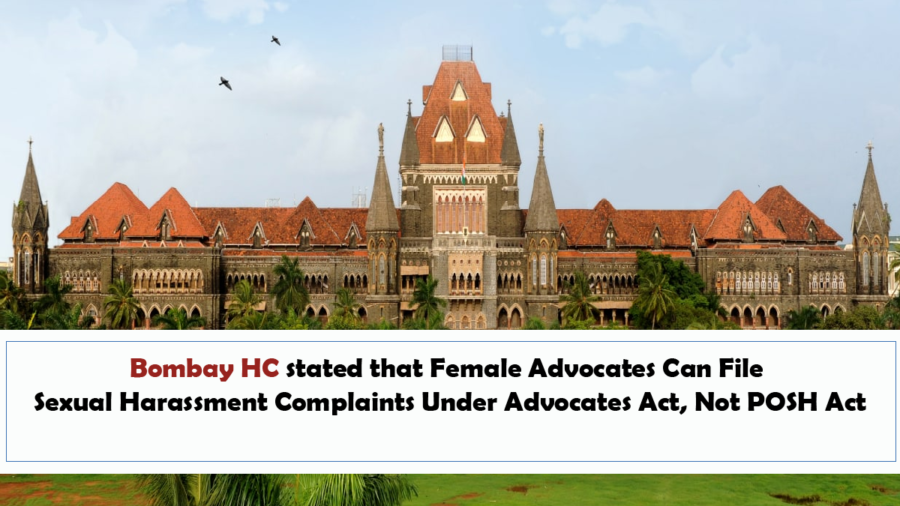Bombay HC stated that Female Advocates Can File Sexual Harassment Complaints Under Advocates Act, Not POSH Act
Facts of the Case
The Public Interest Litigation was filed by the UNS Women Legal Association, a registered society under the Societies Registration Act, 1860. The petitioner sought a direction from the Bombay High Court to the Bar Council of India (BCI) and the Bar Council of Maharashtra & Goa (BCMG) to establish permanent Internal Committees (ICs) for women advocates across all Bar Council offices and Bar Associations in the state. The petitioner relied on the Supreme Court’s guidelines in Medha Kotwal Lele v. Union of India [(2013) 1 SCC 297] and the provisions of the Sexual Harassment of Women at Workplace (Prevention, Prohibition and Redressal) Act, 2013 (commonly referred to as the POSH Act). The plea argued that women advocates, like any other professionals, are entitled to protection under the Act and that Bar Councils must institutionalise mechanisms for redressal of sexual harassment complaints. The High Court heard submissions from Dr. Milind Sathe, senior counsel for BCMG, Mr. Shekhar Jagtap for BCI, and Ms. Jyoti Chavan, Additional Government Pleader for the State.
Contentions of the Petitioner
The petitioner contended that despite the clear mandate of the POSH Act and judicial pronouncements recognizing the right of women to a safe workplace, there was no established mechanism within Bar Councils or Bar Associations for women advocates to raise complaints of sexual harassment against fellow lawyers. Referring to the 1997 decision in Vishaka v. State of Rajasthan and the 2013 Medha Kotwal Lele guidelines, the petitioner argued that professional bodies like the Bar Councils must not be exempt from the statutory obligation to constitute Internal Committees. The absence of such committees left women advocates vulnerable and without effective redressal. They asserted that the Bar Council, as a professional regulatory authority, exercises significant control over advocates and their conduct, and therefore falls within the scope of the POSH Act, which applies broadly to workplaces. The petitioner urged the Court to direct compliance with the statute and guidelines to ensure the protection of women advocates.
Contentions of the Respondents
The Bar Council of India and the Bar Council of Maharashtra & Goa resisted the petition primarily on jurisdictional grounds. They argued that the POSH Act, by its explicit language in Sections 2(f) and 2(g), applies only where there exists an employer-employee relationship. Since advocates enrolled with the Bar are independent professionals and not employees of the Bar Councils, the statutory definition does not encompass them. The respondents further submitted that Internal Committees had already been constituted under the POSH Act for the benefit of their own employees, and thus there was no violation of the Act in that respect. They emphasized that complaints between advocates were governed by the Advocates Act, 1961, particularly Section 35, which provides a disciplinary mechanism for addressing both professional and other forms of misconduct by advocates. Thus, any grievances by women advocates against other lawyers could be addressed within the framework of the Advocates Act, not the POSH Act.
Court’s Observations
The Division Bench comprising Chief Justice Alok Aradhe and Justice Sandeep Marne accepted the respondents’ argument that the POSH Act requires an employer-employee relationship for its applicability. Citing Sections 2(f) and 2(g) of the Act, the Court held that the definition of “employee” does not cover advocates practicing independently, nor can the Bar Council be treated as their “employer.” Consequently, the Court concluded that the POSH Act could not be extended to grievances raised by women advocates against fellow lawyers in the absence of such a legal relationship. The Court reaffirmed that while women advocates deserve protection, the appropriate statutory remedy in such cases lies under the Advocates Act, 1961. Specifically, Section 35 provides for disciplinary action against advocates found guilty of misconduct, which includes harassment.
The Court, however, clarified that the POSH Act remains fully applicable to regular employees of the BCI and BCMG, including administrative staff and committee members, and ICCs are mandatory for handling such internal complaints. The judges rejected the plea for extending the Act beyond its legislative scope by judicial interpretation, noting that such an expansion would conflict with the statutory text and principles of legal interpretation.
Court’s Order
The High Court disposed of the PIL by declining to issue any further directions. It held that the POSH Act does not apply to complaints of sexual harassment made by women advocates against other lawyers because no employer-employee relationship exists between the Bar Councils and advocates. However, it noted that women advocates are not without remedy they may approach the appropriate Bar Council under Section 35 of the Advocates Act for redressal of misconduct. The Court took on record the submission that Internal Committees had already been constituted for Bar Council employees. With these observations, the PIL was dismissed.
Written by Adv. Deeksha Rai



